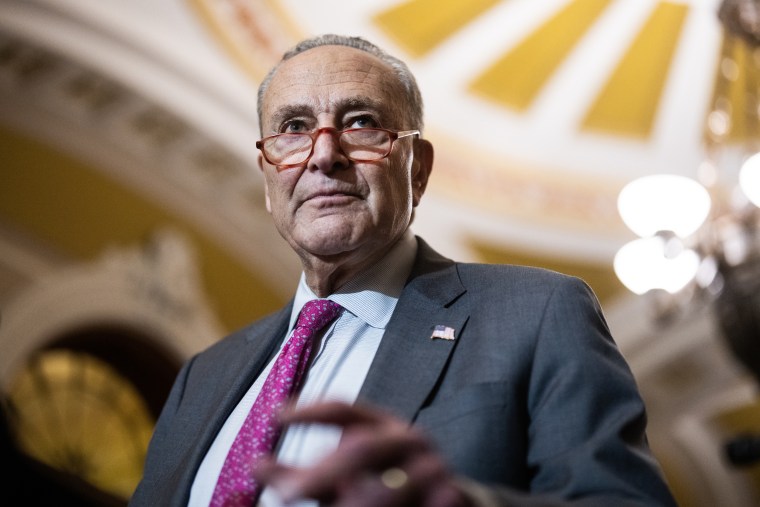WASHINGTON — Israeli Prime Minister Benjamin Netanyahu spoke virtually to Republican senators during a closed-door meeting Wednesday and found a welcome reception.
But Senate Majority Leader Chuck Schumer, D-N.Y., declined a request by Netanyahu to address the Senate Democratic Caucus, a spokesperson for Schumer said, adding: “Sen. Schumer made it clear that he does not think these discussions should happen in a partisan manner. That’s not helpful to Israel.”
The split-screen highlights the polarizing American views of Netanyahu and Israel's conduct in Gaza, which has led to cracks in what was once rock-solid bipartisan support for Israel's government. Tensions between Netanyahu and top Democratic leaders in the U.S. are escalating amid a growing and deadly war in the Middle East that began after the Hamas attack on Israelis on Oct. 7.

Schumer addressed questions about Netanyahu at his weekly news conference Wednesday, saying Netanyahu has only himself to blame for the cracks in U.S. solidarity with his government.
“When you make these issues partisan, you hurt the cause of Israel,” Schumer told reporters, standing by his call last week for new elections in Israel.
Schumer has drawn condemnation from Republicans for the speech, in which he said Netanyahu has “lost his way” and put his own political interest above the survival of Israel. “I gave this speech out of a real love for Israel,” Schumer said Wednesday.
The roots of Democratic angst with Netanyahu trace back to the era of former President Barack Obama, when Netanyahu took a publicly confrontational attitude with Obama and aligned with the GOP. In 2012, Netanyahu's rhetoric fueled a belief that he was seeking to boost Republican nominee Mitt Romney in the election. In 2015, Netanyahu accepted an invitation from House Republicans to address Congress and criticized Obama’s diplomatic negotiations with Iran.
At the time, Sen. Dick Durbin of Illinois, the No. 2 Democrat, privately warned Netanyahu he was hurting his own country by meddling in a U.S. political dispute.
“I brought it up to him personally — told him it used to be a bipartisan cause, the future of Israel. He’s making it a one-party monopoly in terms of his alliances,” Durbin recalled to NBC News this week. “That’s a serious mistake for Israel.”
On Wednesday, Senate Minority Leader Mitch McConnell, R-Ky., said he told Netanyahu directly that he disagrees with Schumer.
“I made it clear to him that it’s not the business of the United States to be giving a democratic ally advice about when to have an election or what kind of military campaign they’re conducting,” McConnell told reporters. “We obviously have a lot in common. But it seems to me the bipartisan support for Israel seems to be cracking on the political left of this country.”
Sen. Tommy Tuberville, R-Ala., summed up Netanyahu’s message to Republicans as: “We’re not looking for a tie. We’re looking for a win. We’re going to continue to fight to wipe out Hamas.”
Sen. Josh Hawley, R-Mo., said Netanyahu was asked about Schumer’s comments about a new election in Israel.
“He was very direct, he said he thought that Sen. Schumer’s remarks were wholly inappropriate and outrageous,” Hawley said. “And obviously he took great offense.”
Said Tuberville, “We’re more embarrassed than he is."

